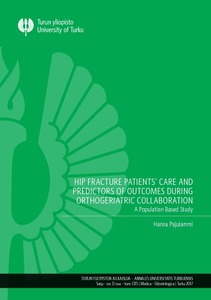Hip fracture patients' care and predictors of outcomes during orthogeriatric collaboration : a population based study
Pajulammi, Hanna (2017-11-24)
Hip fracture patients' care and predictors of outcomes during orthogeriatric collaboration : a population based study
Pajulammi, Hanna
(24.11.2017)
Turun yliopisto
Julkaisun pysyvä osoite on:
https://urn.fi/URN:ISBN:978-951-29-7006-3
https://urn.fi/URN:ISBN:978-951-29-7006-3
Kuvaus
ei tietoa saavutettavuudesta
Tiivistelmä
The aim of this study was to identify more predictors of mortality and functional recovery in older hip fracture patients, explore the background of an effective orthogeriatric program and evaluate the quality-related changes in care during orthogeriatric collaboration.
This study was based on the data of hip fracture patients aged 65 years or older treated in Seinäjoki Central Hospital between 2007 and 2015 (n=1,756). Of older hip fracture patients, those previously able to walk outside unassisted or live without organized home care were found to be at greatest risk for declined mobility and in need of more supported living arrangements. Of the medical conditions, renal insufficiency beyond moderate or having more than three medications increased the risk of mortality after hip fracture. Of the care related actions, indwelling urinary catheter (IUC) removal while hospitalized was associated with decreased risk of decline in mobility level and living arrangements and 1-year mortality.
During the orthogeriatric collaboration, markedly more patients received comprehensive geriatric assessment (CGA), and for these patients, 1-month survival improved. With CGA, short-term mortality of high-risk patients with renal insufficiency, polypharmacy or cognitive disorder was reduced. Of the care procedures, adherence to the standardized care protocol on red blood cell transfusions and removal of the IUC was better when CGA was delivered. Surgery in <24h hours increased during orthogeriatric collaboration but independent of CGA. Also, general expertise in geriatric care improved as more IUCs were removed without geriatrician’s involvement.
To decrease hip fracture –related mortality and improve the general quality of care, an orthogeriatric hip fracture program with standardized care protocol and a multidisciplinary team should be considered a routine care in hospitals providing acute surgical care for older hip fracture patients.
This study was based on the data of hip fracture patients aged 65 years or older treated in Seinäjoki Central Hospital between 2007 and 2015 (n=1,756). Of older hip fracture patients, those previously able to walk outside unassisted or live without organized home care were found to be at greatest risk for declined mobility and in need of more supported living arrangements. Of the medical conditions, renal insufficiency beyond moderate or having more than three medications increased the risk of mortality after hip fracture. Of the care related actions, indwelling urinary catheter (IUC) removal while hospitalized was associated with decreased risk of decline in mobility level and living arrangements and 1-year mortality.
During the orthogeriatric collaboration, markedly more patients received comprehensive geriatric assessment (CGA), and for these patients, 1-month survival improved. With CGA, short-term mortality of high-risk patients with renal insufficiency, polypharmacy or cognitive disorder was reduced. Of the care procedures, adherence to the standardized care protocol on red blood cell transfusions and removal of the IUC was better when CGA was delivered. Surgery in <24h hours increased during orthogeriatric collaboration but independent of CGA. Also, general expertise in geriatric care improved as more IUCs were removed without geriatrician’s involvement.
To decrease hip fracture –related mortality and improve the general quality of care, an orthogeriatric hip fracture program with standardized care protocol and a multidisciplinary team should be considered a routine care in hospitals providing acute surgical care for older hip fracture patients.
Kokoelmat
- Väitöskirjat [3105]
